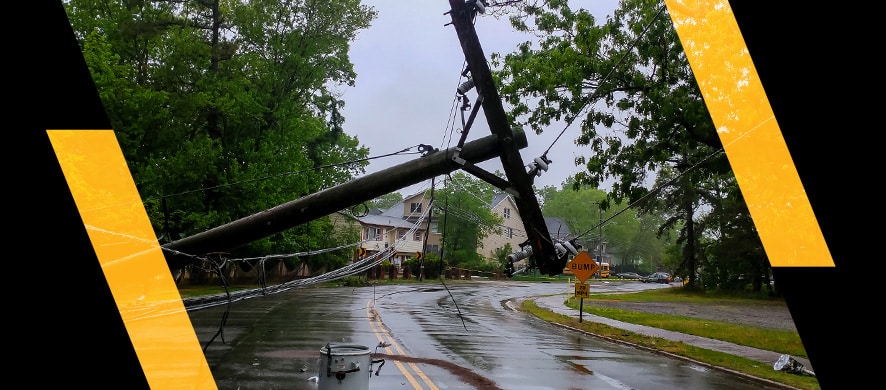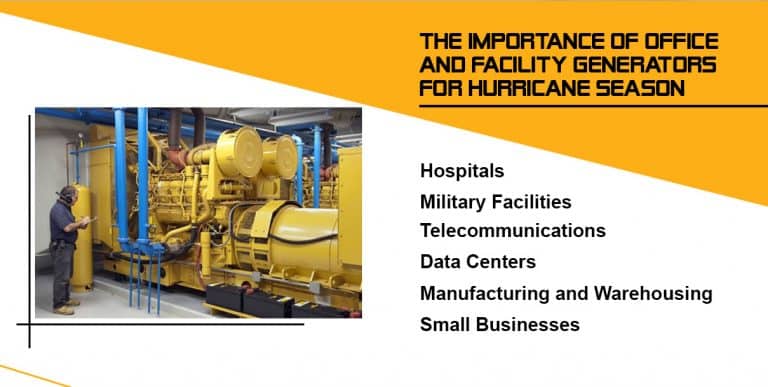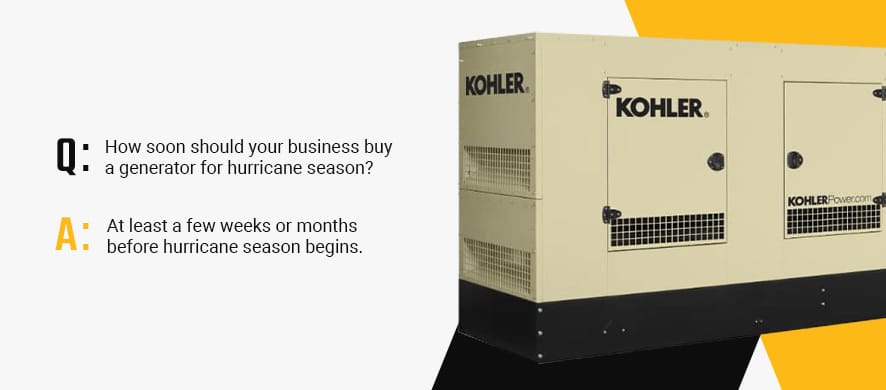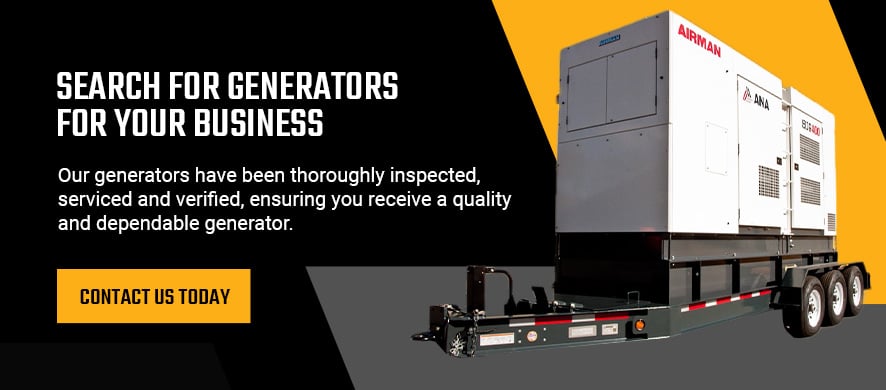Hurricane Preparation and Emergency Power Generators

Names like Katrina, Maria and Irma are all too familiar for those in hurricane-prone regions across the United States.
Every year, hurricanes wreak billions in damage for commercial entities and residents alike in top-effected states like Florida, Texas and Louisiana. Nearly every business type in these areas will lose power at some point, if not numerous times, during a hurricane’s life cycle. In certain industries, from health care and military to manufacturing and food and beverage services, these power outages are not just revenue-cutting — they’re life-threatening.
Your business cannot afford — literally or figuratively — to wait until a Category 5 storm is imminent to prepare its contingency plan for safety and power. Natural disasters often occur with little to no warning. Workplace hurricane preparedness is paramount, starting with a hurricane readiness action plan and leading up to equipping your facilities with the best generators and backup generators for hurricanes. Preparing for such instances is crucial to keeping your employees, business and assets safe during hurricane season.
The Importance of Backup Generators for Hurricane Season

The importance of installing backup generators before or during hurricane season cannot be overstressed. Whether you’re managing a small business with a single storefront, a medical center with dozens of patients or a cold-storage warehouse with hundreds, if not thousands, of at-risk inventory items, it is mission-critical to outfit your facility with an independent source of power.
Consider the implications on these industries where hurricane backup generators are not merely a convenience but essential to function:
- Hospitals: Lost power at a hospital, long-term care or assisted living facility, rehab center or any other health care institution such as emergency rooms seriously jeopardizes that institution’s ability to deliver even the most basic care. On a quantitative level, hospitals face significant costs from lost power — factor in the health and safety risks of inoperable machines and medical equipment and those costs skyrocket.
- Military facilities: Military bases and related installations rely on power for many critical tasks, like surveillance and defense. Military branches may also be called upon to establish field hospitals that can be used to render first aid to those affected by natural disasters. Having a reliable source of backup power during outages caused by natural disasters can be crucial to life saving and sheltering services.
- Telecommunications companies and data centers: Network outages can be hugely expensive for organizations, costing at least $100,000 for most businesses affected by outages in 2021. Naturally, power cuts for telecommunications companies significantly impact operations.
- Manufacturing and warehousing: Downtime in small-batch and continuous manufacturing operations can cost hundreds of thousands of dollars per hour.
How to Prepare Your Business for a Hurricane
In the Atlantic and Central Pacific regions, hurricane season begins in early June and ends in November. That’s half a year for hurricanes to potentially devastate areas along the Atlantic Ocean, Caribbean Sea, Gulf of Mexico, Florida and Gulf Coast. With a peak period that typically runs from early August to the end of October, hurricanes are one of the most deadly and costly natural disasters for facilities in these coastal areas.
For businesses and offices, hurricane preparedness and informed decisions are the first vital steps in mitigating risks for employees. First and foremost, your business faces a core question in the event of a weather emergency or other natural disaster — should I stay, or should I go? In either case, you’ll need an emergency action plan.
Disaster Recovery Plan
If you plan to continue your business during a hurricane — or the facility cannot functionally “shut down,” as is the case in health care, military, telecommunications or other essential businesses — then you must create a disaster recovery plan. This emergency action plan should include communications and logistics for you and your employees so you can maintain order even amidst a hurricane’s chaos. It should also outline your plan for resuming operations.
While some tasks will only occur when a hurricane is approaching, you’ll need to finish other processes far ahead of time, including creating the disaster recovery plan itself. Consider the following elements in your emergency action plan:
- Create a hurricane emergency kit: Build an emergency kit with basic supplies like nonperishable food, a gallon of water per person, first-aid kits and flashlights. Include communication tools like a battery-powered radio, cell phones, portable chargers and whistles. Moist towelettes and garbage bags can also help with sanitation.
- Establish secure meeting points and safe rooms: If a hurricane approaches, make sure these locations are viable, and share them widely with all employees.
- Conduct drills for employees that review actions that must be taken in order to ensure the safety of all those involved.
- Consider items for recovery efforts: You may also store supplies for emergency responses, such as portable pumps and hoses, emergency lights, tarps, and sandbags.
- Update your insurance plans: Regularly review your insurance policies to ensure they cover your assets, which can change as the business evolves.
These plans can be complex, but you can access many resources to help. The American Red Cross Ready Rating program, for example, can help you build a plan and even receive a Ready Rating Seal that shows your commitment to disaster preparedness.
Evacuation Plan
In the case of an ordered evacuation, be open to the possibility of leaving your business behind. Allocate time for travel and know where the nearest safety shelter is located. Evacuation plans are noted for each community. You should know the route to safely evacuate and any alternative routes.
Even with a disaster recovery plan in place, you must evacuate if your business was built before hurricane building standards, your business is vulnerable to flooding and high winds or an official evacuation order has been issued. Prearrange a safe place to stay with family and friends or at an American Red Cross location. Prepare a list of emergency contacts, and again, don’t wait until the last minute. Leave 24 to 36 hours before the hurricane hits, and stay off roads when it does.
Organize a to-do list before leaving that includes:
- Turning off electricity.
- Bracing entry points.
- Locking windows and doors.
- Storing important paperwork in a secure location.
- Removing items from high shelving.
Hurricane Preparedness Checklist for Businesses
Along with preparing an emergency kit and outlining your plans, form a safety checklist that makes it easy to take action. Include the following steps to protect yourself and your business if a hurricane is approaching:
- Stay in touch: Many apps and resources can help you stay in touch with employees, family and friends. Keep tabs on their locations with an app from the American Red Cross or weather-resistant emergency radios. These radios often charge via hand cranks and can help you stay updated on the latest news. The American Red Cross also has an app with first-aid guidance and one for medical professionals about transfusion practice guidelines.
- Stock up on gas: If authorities issue an evacuation order, fill up your car and other gas tanks to avoid hectic lines at the station. Buying a refillable tank, often sold at gas stations and hardware stores, can help in emergency situations.
- Seek shelter: Locate the nearest shelter to protect you, your family, pets and employees if needed. You may want to check with shelters before a storm to confirm capacity.
- Prepare your business: Use hurricane shutters and board up windows with plywood for reinforcement. Bring any outside items inside your business or a garage to avoid high-wind damage. Safely shut down noncritical electronics and save work to prevent power surge damage or data loss from a sudden outage.
Employee Hurricane Prep
As a business owner, you are responsible for the safety and health of your workers. You are required to protect them from anticipated disasters on your premises. Communicating your emergency protocols and hurricane recovery plan, along with designated meeting points and safe room locations, is essential to keeping your employees safe during a hurricane. Ensuring the roles and responsibilities of every employee sets expectations on how to prepare for severe weather.
Keep your employees updated on scheduling procedures, resumption of operation and available employee assistance programs (EAPs). Update a predesignated emergency phone number frequently along with other relevant information.
Depending on the severity of the storm and outage, consider whether you will send employees home or have them work remotely. Keep in touch about these expectations and when work will resume. Ensure all employees know how to interpret a storm forecast, such as understanding the differences between a watch and a warning. Also, determine who will be responsible for different tasks, like determining whether to send employees home and leading the recovery process.
After a hurricane passes, you will likely need to recover your business from destruction. If you use your employees for help, follow safe procedures and general precautions, such as:
- Using teams of two or more to lift heavy or water-laden objects.
- Having a first-aid kit available.
- Checking flooded areas for holes or protruding objects.
- Reporting obvious hazards.
- Never touching downed power lines.
Power Outage Prevention for Hurricanes
There’s nothing you can do to prevent a power outage arising from inclement weather, but you can take some precautions to prevent the outage from negatively impacting your business:
- Implement a reliable generator.
- Invest in surge protection for your business equipment.
- Check backup systems for exit signs, smoke alarms and sprinklers.
- Know how to use your industrial power generator safely.
- Include a company-wide protocol that ensures the health and safety of any on-site employees.
- Ensure your generator is located in a no flood zone or if you have a generator room, that it is watertight to prevent floodwaters from reaching the generator.
- Prepare your generator for use to minimize the gap between electricity from the utility and generator power.
With a plan in place, you can smoothly transition to your hurricane power generator and prevent sustained power outages from business setbacks, including damage to your systems or equipment.
Choosing an Emergency Backup Generator for Hurricane Season
Your generator is one of the most important components of an emergency response plan, especially in critical businesses that cannot shut down during bad weather. Finding the right one for your organization is crucial for ensuring a dependable response with the right capacity and accessible fuel. Some things to consider include:
- Generator types: The most common types of generators include standby generators for backup power, portable generators for situational use or complete industrial power systems for the highest-demand operations. Generators can provide power to your appliances, infrastructure and assets, such as your security system and IT systems, keeping them operational. A commercial or industrial automatic standby generator automatically turns on and restores power, shutting off when the power returns. Portable generators can support multiple simultaneous functions or back up your entire business for either long-term or temporary use.
- Generator power source: Select the power source most likely to meet the demands of your exact facility type and industry. These include battery, diesel, gasoline and natural gas. Do note, however, that in the event of a hurricane, natural gas lines will be powered down to prevent ruptures and, therefore, unusable during severe weather — unless you use a generator that can switch to propane when needed.
- New or used: Your business can buy new or used generators to maintain infrastructure cost-effectiveness.
- Purchased or rented: Renting a portable generator could be the ideal choice during peak hurricane season. Portable generator rentals are great for facilities or offices that cannot accommodate space to install a permanent standby generator. They can also be great for redundancy purposes in case the primary backup generator were to fail due to hurricane-related issues or malfunction.
How Soon Should Your Business Buy a Generator for Hurricane Season?
If you want to buy a generator rather than rent during hurricane season, aim to buy it as early as possible — at least a few weeks or months before hurricane season begins. The more complex your operation is, the more time you may need to choose, install and learn how to use the generator.

Best Generators for Hurricane Season
Generators are in high demand during hurricane season and in the most vulnerable areas, like Florida and the Gulf Coast. While some generator manufacturers meet this demand by upping seasonal unit production, others — like Woodstock Power — offer portable commercial and industrial generator rentals that ship across the country and are the economical choice for many businesses.
While there are different types of generators, the only significant differences between them are the size, power capacity and type of fuel used to run the units. Each has specific benefits. Depending on your business’s needs, consider the following options while looking for the best generators for hurricane season:
Portable Commercial Generators
You can use commercial diesel portable generators in places not powered by an electrical grid or as emergency power supplies. They are incredibly fuel-efficient, using about half as much fuel as gas generators, meaning they can last longer. While diesel fuel is typically more expensive, its higher performance and reduced maintenance costs make it more cost-effective in the long term.
Another benefit of diesel generators is their minimal maintenance requirements, as they do not have spark plugs or wiring. In a severe weather emergency, you do not want to worry about troubleshooting or replacing parts of your generator.
Diesel generators are also safer and easier to store than their gasoline-powered counterparts. Because diesel burns cleaner, it reduces the risk of ignition and related fire hazards. Gas generators are more explosion-prone than diesel.
Before the onset of hurricane season, you should change your portable generator’s oil, air filter and fuel filter. Always use caution and follow safety procedures when preparing your unit.
Standby Natural Gas Commercial Generators
Natural gas generators offer the benefits of cleaner and less expensive fuel. A clean-burning natural gas generator allows you to meet emissions standards and leverage the relatively low price of fuel for long-term cost-efficiency.
These generators are tied to a natural gas pipeline, so you typically don’t need to worry about running out of fuel. During hurricane season, however, natural gas companies often shut down gas lines to prevent ruptures, so a natural gas generator might not have fuel in an emergency. Fortunately, you can mitigate this problem by purchasing a natural gas generator capable of running on propane or using a conversion kit on a model without this capability.
Standby Diesel Commercial Generators
Standby diesel generators are one of the most common types on the market. They are extremely fuel-efficient, durable and versatile, satisfying power requirements across various industries.
A downside to diesel generators is their fuel capacity. A diesel generator can only operate as long as it has a steady supply of diesel fuel. Organizations often attach suitable tanks to the diesel generator to supply enough fuel for 24 hours, 48 hours or more if needed. When it comes to emergency situations like hurricanes, working out the logistics for refueling a diesel generator is crucial.
If you rely on diesel fuel deliveries, can your provider deliver in the event of an emergency? Is a diesel fuel supply readily available in your area? Will you allocate space to store diesel fuel within your facility to ensure the diesel generator can continue operating? Consider these important factors when selecting a diesel generator.
Generator Safety Tips During Hurricanes
If misused, hurricane backup generators may cause serious harm to you, your business and your employees. To ensure the safe use of generators during a natural disaster, follow these tips:
- Place the generator at least 30 feet from your business.
- Operate in dry areas away from flooding and rain.
- Store fuel containers away from generators and other heat-emitting objects.
- Never plug a generator directly into your power outlets.
- Be cautious of carbon monoxide poisoning.
- Clear away any debris, and avoid placing your generator in an area where it would be prone to damage from flooding or fallen objects.
- Perform all necessary generator service and maintenance, including regular testing and inspections.
- Check fluids and fuel lines, and conduct a load bank test.
When you’re running a portable generator, keep the following best practices in mind:
- Make sure all necessary connections are made in a safe, dry area before moving the generator outside for operation.
- Run the generator outside.
- Keep it away from open windows or garages.
- Have a carbon monoxide detector in your business, and monitor for natural gas leaks.
- Purchase extra gas — order fuel on standby from a local agency, especially if you expect a prolonged power outage.
- If possible, have a master electrician or certified generator operator available to ensure safe handling and use of a portable generator.
How to Get a Disaster-Ready Generator
Those looking to bolster their hurricane responsiveness and create an airtight contingency plan can begin doing so immediately. With the following steps, you can secure the ideal emergency backup generator for your small business or facility through Woodstock Power’s unique generator selection and installation network:
- System assessment and selection: We have a nationwide web of electricians and partner businesses who can be deployed to your commercial facility, analyze its infrastructure and lend quality expertise on the exact type of generator you’ll need during a weather emergency.
- Unit matching: Based on their findings, we can help match you with the ideal generator unit, help you decide whether to purchase or rent and choose the right fuel configuration for you.
- Installation or commissioning: Aside from shipping you your hurricane backup generator, we’ll ensure safe on-site installation and instruction so you have one less thing to worry about.
- Decommissioning: Our same team of trusted partners will come and take the generator off your hands once hurricane season is over or your rental needs are satisfied. This includes professionally neutralizing its fuel source, handling related fluids and safely disposing of excess contaminants or beyond-use materials.
At Woodstock Power, we make finding and selecting the right generator for your contingency needs as easy as possible so your business is prepared during emergency situations. No matter your location, our generators are immediately available from different holding sites across America, and we can quickly ship generator equipment anywhere in the U.S. Because we have strong relationships with companies throughout the country, Woodstock Power provides additional services and turnkey solutions.
Search for Generators for Your Business With the Woodstock Power Company Experience
Hurricane season is a time of unrest and worry for all business owners. But it doesn’t have to be with the service of rented stationary and portable generators to keep your business safe and operational.
While headquartered in Philadelphia, Woodstock Power operates nationwide. We offer customers the option to buy or rent industrial and commercial generators, depending on their needs and budget. We also sell used generators tested to ensure peak operating conditions and immediate service.
We offer a selection of disaster response-ready generators, including diesel, natural gas and three-phase that meet top-tier regulations. Woodstock Power provides each model and brand with its own spec sheet, delivering information specific to each unit. That way, you can avoid unnecessary and exhaustive research.
We are industry leaders in buying and selling used generators to fit the needs of numerous businesses, including commercial, industrial, agricultural, medical and university. We serve various facilities, including hospitals, hotels, nursing homes, better living centers, airports, retail centers, restaurants, manufacturers and more.
Our experts will answer any questions you have about our available units, helping you find the right solution based on:
- Peak & Average Power Requirements
- Fuel Preference (Natural Gas or Diesel)
- Portability & Stationary Power
- Prime & Standby Generator Requirements
- Available Space & Exhaust Restrictions
We carry only the most top-rated new, used and surplus generators, giving you a high-value unit that meets your budget.
Our generators have been thoroughly inspected, serviced and verified, ensuring you receive a quality and dependable generator. If a generator does not align with industry standards, we’ll complete all necessary repairs or modifications and fully test the unit before we sell it. This ensures a full turnkey generator that’s ready to fire up and go!
With our vast selection of generator sets, you can easily find the right model for your operational requirements and budget.
We also buy used generators in good quality if you have already upgraded and are looking to sell your older unit.
Please contact us with questions, concerns or inquiries to learn more about the Woodstock Power Company experience and the quality level of products and services we provide.


